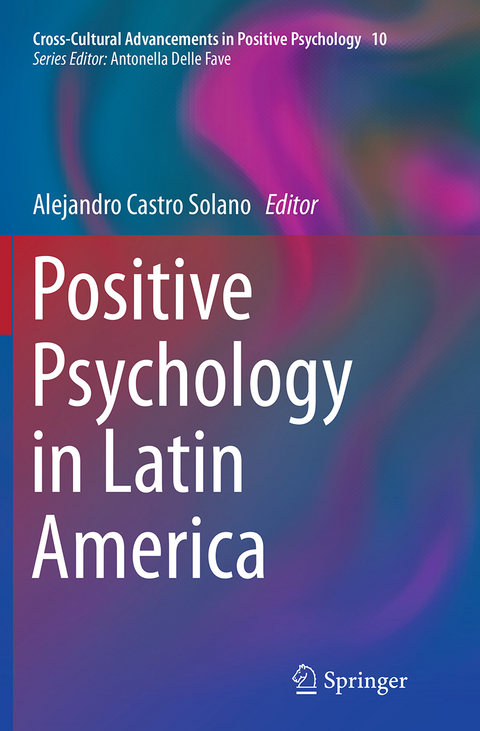
Positive Psychology in Latin America
Springer (Verlag)
978-94-024-0739-6 (ISBN)
The volume is organized into four sections. The first section presents the importance of test adaption and construction in order to assess Positive Psychology constructs, with a special focus on well-being as a core construct. The second section summarizes a group of research studies carefully designed to predict academic achievement applying Positive Psychology constructs. The third section outlines a set of studies intended to develop flow, resilience, social skills and positive emotionsin children at risk. And finally the fourth and last section introduces two points of view focused on communities in order to assess positive dimensions and to promote positive behaviors.
This volume, aimed at researchers and Psychology, Education, Health and the Social Sciences students, is a useful tool for people interested in the development of Positive Psychology in Latin American countries.
Alejandro Castro Solano, Ph.D in Psychology is a senior researcher at National Council of Scientific and Technical Research (CONICET, Argentina). He is a professor at the University of Palermo and University of Buenos Aires, where he teaches research methods and psychological assessment for undergraduate and postgraduate students. His research interests are related to test construction, leadership and positive psychology. Currently he is in charge of the Psychology PhD Program at the University of Palermo. He has served as a member of the IPPA´s Board of Directors since 2009.
Part I. General Approach to Positive Psychology in Latin America.- Chapter 1. Overview of Positive Psychology in Latin American Countries; Alejandro Castro Solano.- Chapter 2. Latin-American Studies on Well-Being; Alejandro Castro Solano.- Chapter 3. Positive Psychological Assessment in Latin America; Maria Laura Lupano Perugini.- Part II. Positive Psychology and Academic Achievement.- Chapter 4. Perceived Parenting Style: Its Central Role in Psychological Adjustment and Academic Achievement of Argentine Students; Mercedes Fernández Liporace and Guadalupe de la Iglesia.- Chapter 5. Cultural Competences of International Students: Its Role on Successful Sociocultural and Psychological Adaptation; Alejandro Castro Solano and Ines Aristegui.- Chapter 6. Character Strengths: Measurement and Studies in Argentina with Military and General Population Samples; Alejandro C. Cosentino.- Chapter 7. Positive Psychology and Academic Performance: A Brazilian Initiative; Lilian Graziano.- Part III. Positive Psychology and Childhood.- Chapter 8. Positive Emotions in Children: Current Research and Future Directions; Laura Oros.- Chapter 9. Optimal Experience in Argentinean Children and Adolescents; Belén Mesurado and María Cristina Richaud de Minzi.- Chapter 10. Childhood Pro social Behavior in the School Environment; Vivian N. Lemos and María Cristina Richaud de Minzi.- Chapter 11. Promotion of Resilience in Children in Social Vulnerability; María Cristina Richaud de Minzo and Viviana N. Lemos.- Chapter 12. Social Skills of Children in Vulnerable Conditions in Northern Argentina; Ana Betina Lacunza.- Part IV. Positive Psychology: Community and Health.- Chapter 13. Positive Communities: Dimensions for Assessment and Intervention; Graciela Tonon.- Chapter 14. Re-inventing School to Develop Active Citizens; Ulisses F. Araujo and Valeria A. Arantes.- Chapter 15. The Influence Relations among Three Traditions of Well-Being and Social Support and the Associations with Age and Health; Lucia Helena W. de Freitas.
| Erscheinungsdatum | 23.09.2022 |
|---|---|
| Reihe/Serie | Cross-Cultural Advancements in Positive Psychology ; 10 |
| Zusatzinfo | 20 Illustrations, color; 10 Illustrations, black and white; XII, 273 p. 30 illus., 20 illus. in color. |
| Verlagsort | Dordrecht |
| Sprache | englisch |
| Maße | 155 x 235 mm |
| Themenwelt | Geisteswissenschaften ► Psychologie ► Allgemeine Psychologie |
| Geisteswissenschaften ► Psychologie ► Humanistische Psychotherapien | |
| Geisteswissenschaften ► Psychologie ► Pädagogische Psychologie | |
| Studium ► Querschnittsbereiche ► Prävention / Gesundheitsförderung | |
| Sozialwissenschaften ► Soziologie | |
| ISBN-10 | 94-024-0739-1 / 9402407391 |
| ISBN-13 | 978-94-024-0739-6 / 9789402407396 |
| Zustand | Neuware |
| Haben Sie eine Frage zum Produkt? |
aus dem Bereich


